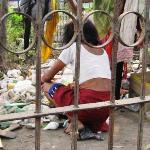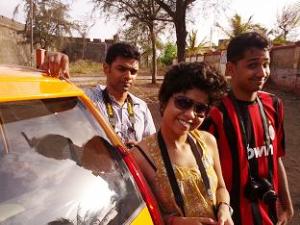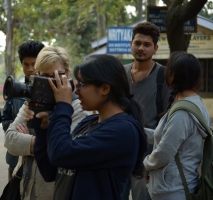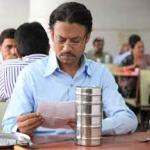Walk around the streets of Guwahati’s different boroughs, and it is normal to see women who seem to be mentally ill loitering around, making the sheds available on streets, their dwelling places. Our normal reaction to such people would be, to avoid any eye contact. Look away. Pretend they do not exist. Bury the guilt, if any.
If we as a nation could get stirred by the brutal rape and killing of a girl on the streets of Delhi, why not spare a thought for these individuals who are no less human, like you and me? Who would have walked out of homes because they were ill, or fell ill because they have no home!
Recently, a news channel carried out a discussion on and with such women who got rescued by an organization from the utterly dreadful conditions of the street.
The discussion revealed that they were given adequate treatment and within a very short period of time they are back to the mainstream to survive on their own. Professional training was provided to them to earn their own livelihood in the future course of their life. A shocking truth emerged though. One of the women got raped several times, resulting in her pregnancy, when she lived on the street. She now has a girl child.
Such incidents raise questions about us – us living in our so-called civilized society of which we are very much a part.
When someone in a family suffers from any mental disease or any kind of abnormality is seen, s/he is readily given the tag of `pagal’ (insane) and becomes the object of ridicule and abuse. They are hardly taken care and provided adequate treatment. In worst cases, such sufferers leave homes unknowingly. Or their families deliberately abandon them.
Ashadeep, a pioneer organization of its kind, has proven to be a boon for the mentally ill women, and we at The Thumb Print do not mind singing praises of this organization. Because, this one does exactly the opposite of what most of us would do. Ashadeep treats the mentally ill with dignity.
The next time you see a woman who is wandering the streets of Guwahati, helpless and seemingly insane, stop for a minute and put aside your ignorance. She may be crying for help. Get her the help. A visit to Ashadeep’s Kahilipara center provides a great insight into the activities of the organization. It is a mental health society which is spread all over Assam, working for the destitute.
Ashadeep was conceptualized and implemented with the initiative of Dr Anjana Goswami and Dr Mukul Goswami and a few more people who have people with mental illness in their own family.
Ashadeep has grown into a full-fledged organization over time.
Dr Anjana Goswami says they realized that mentally ill patients can be taken proper care of at home with some training, acquiring management skills, monitoring skills and coping skills.
Navachetna means renewed consciousness, a specialized wing of Ashadeep which means a ray of hope, heralded the mission to rehabilitate the mentally ill women since 2005 with the initial and continued support of Ratan Tata Trust, the prime objective of it being reintegrating the victims with their families once they are restored to proper mental and physical health.
When asked why only women get shelter, Dr Goswami said that it is because the women are more vulnerable to exploitation and sexual abuse. ``So they need more care and protection.’’ They now are thinking up centers for mentally ill men too.
Many victims end up on streets because they are mentally ill.
Many end up with such disorders because of their homelessness though.
Appalling living conditions of the street life of homeless women takes a toll on their minds. They become vulnerable to diseases, mainly skin and gynecology related. They are brought to Ashadeep either by the organization members, or sometimes informed by the police and public.
It started as a single shelter with the capacity to support 20 inmates. Gradually, to accommodate the increasing numbers of patients, Navachetna was divided into two divisions- Navachetna Transit Care that is located at Rehabari and Navachetna Rehabilitation Home situated in Panjabari.
Pranita, who is in-charge of the Bishnu Nagar Panjabari center says a panel of doctors visits them regularly.
Others are called based on the women’s needs. When the victims are brought from the streets, it sometimes takes about six months to nursing them back to health.
Do families ever come forward to take the women home? Pranita told The Thumb Print that constant effort is made to reintegrate them with their families. Many times they get lucky, but ``sometimes it becomes difficult to trace families’’.
Do families accept them whole heartedly? Or consider them normal? Once someone returns from a rehab or any asylum, they are always treated as different, sometimes complicating the whole effort. Families end up needing counseling, not just victims.
Dr Anjana Goswami stated that the mentally ill women they shelter are mostly from very poor families. As they become oblivious of their own existence, they leave their homes out of ignorance, rather because of loss of memory. Most of them are never sought out by their families because they are not able to bear responsibility.
But there are some exceptions. Anjana says a girl who landed Guwahati from Bihar was traced by the police in the Railway Station and was handed over to Ashadeep. She recovered considerably under the tender care and treatment of Ashadeep’s devoted team of doctors and staff. And went back home.
On the other hand she referred to another victim a well-educated working woman from an affluent family, who still lives in the Rehabari centre even after she has recovered. She is an orphan who had earlier lived with her brother and sister-in -law who refuse to take her home even after her repeated pleas that she is completely cured now.
Regarding the legal pros and cons of such victims, Junmoni Devi Khaund, a noted lawyer says that “being mentally ill does not mean that the person is deprived of any kind of rights”.
A mentally ill individual is entitled to all the rights as a citizen. The only distressing matter according to Junmoni Devi, is that as they themselves remain unaware, someone has to stand on their behalf to claim their rights. The State legal Services Authority can guide them regarding the proper procedure in case of deprivation.
Dr Anjana Goswami reveals that nearly 60 percent of the women in Navachetna are rape victims. It narrates the story of a woman in her 60s who was gang raped by some young boys about the age of her grandsons. The rapists not only sexually abused the women tortured her in a gruesome manner for their sadistic thrills. Such cases are common, says Dr Goswami.
Most such victims suffer from schizophrenia, a major form of mental illness. Minor illnesses such as depression can also be terrible if not treated.
Seventy per cent of them get cured, depending on the cooperation of the families. Navachetna is concerned with the medication, counseling and rehabilitation of the victims but does not merely limit its responsibilities within its centers. After the victims are reintegrated with their families, Navachetna keeps track of the inmates with adequate follow up, providing them with medicine and routine checkup.
Victims can relapse into illness when they are back with families, so it becomes imperative to be observant of their condition so that it does not take any untoward turn. They are in constant touch with them. They offer professional training for the inmates’ future survival. The inmates who live in the centers at produce wonderful handicraft items that are sold in Guwahati’s retail stores.
Many a time, women get deprived of their legal rights when their husbands get married to other women or they are denied their right to property. Dr Goswami says that they are considering approaching the Legal Cell Aid and Disability Law Unit to provide some of the victims their legal rights.
As for women who got cured at Navachetna, they feel privileged enough to be with the organization that remains with them even after they get cured and are able to take care of themselves. It fosters the feeling of security to the victims that they are no more alone in the world that has been cruel to them.
We need more such organisations in the world today.
Find us on facebook: facebook.com/TheThumbPrintMag

.jpg)





































